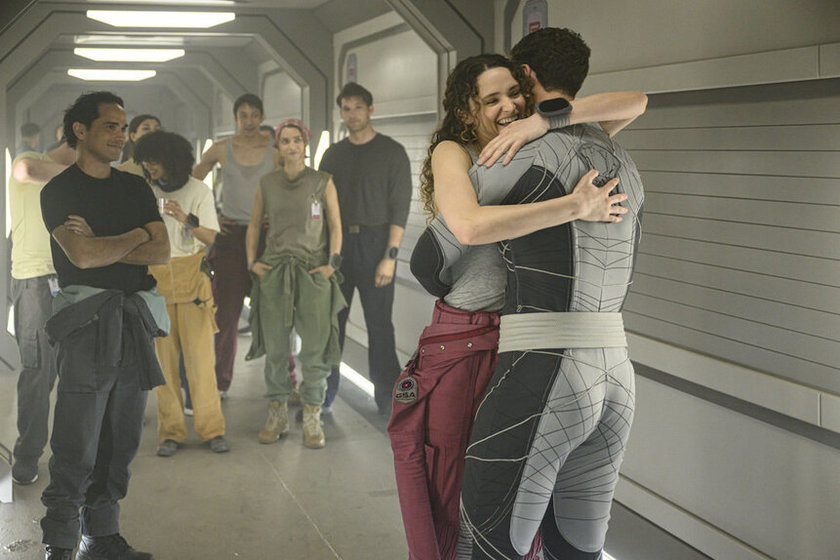I’m happy to report that we didn’t have to wait for the fourth episode for Dean Devlin’s The Ark to get good. “Get Out and Push” (sci-fi metahumor?) gives both the characters and the writers their first real win, when our heroes finally acquire some resources and the writers help us see them as more than archetypes. The second achievement is managed quite simply, and it’s a wonder they didn’t use such an obvious storytelling tool sooner. Which, ironically, is very similar to characters’ predicament and solution.
But we’ll come back to that.
The episode opens with the crew still coping with a massive loss of water, which also left them without their engines. They’re dead in the water, metaphorically speaking, and unfortunately there’s none of that in space (or is there?). By going to half rations they can buy themselves a few more days, and then someone notices that they’re about to get obliterated by a meteor. Now they’re all going to die in a few hours!
The end (not really)
Garnet, the de facto captain, upsets her co-officers by telling the crew about the water shortage. So to keep the peace, she doesn’t mention the new impending doom. Everyone aboard seems to be going through the stages of grief anyway, and the earlier episode’s riot was anger. I guess the drug-fueled dance party in the men’s showers is acceptance? Because aside from a mild tantrum about the water, there’s no more violence.
But about that meteor.
The ship’s engineer, Eva, says it’ll take 12 hours to get the engines online, and unlike Mr. Scott she’s not prone to exaggeration and miracle working. Garnet pulls all the best minds together to find alternative solutions. To the writers’ credit, the farm boy Angus accidentally hits on the answer when he says, “It’s too bad we can’t get out and push.” It would have been easy to make him a bumpkin, but he’s actually an important part of the crew.
They have a lander. They have a pilot. They actually can get out and push.
All it’ll take is a little nudge to change their trajectory enough to avoid the meteor. Unfortunately, Angus also stole some parts from the lander for his indoor greenhouse so it may not be ready in time. Fortunately, they have a plan B, for which he is also helpful. Angus will just use some human waste to make a fertilizer bomb (must’ve been good times on the farm) and use the explosion and depressurization to move The Ark out of the path of destruction.
Simple solutions to big problems. Hold onto that.
The bomb works and they’re saved. Kinda. They still don’t have water. As everyone gathers in the mess to watch meteor fly by, geeky girl Alicia notices that the meteor has a tail. Which means it’s actually a comet. Which means it’s made of ice. Everyone scrambles to figure out how to hitch a ride and pull a reverse Titanic.
Spoiler: it works.
Now their other biggest problem is solved. Along the way, the show’s biggest problem is also fixed. Up until now, we weren’t given any reason to care about these people. Again, they were just a collection of archetypes doing tropey things. An interesting setting wasn’t enough. Conflict wasn’t enough. Mystery wasn’t enough. Something essential was missing to make us connect with these people in their fight for survival.
We needed to be shown that they’re worth caring about.
This is the first episode where everyone works together as a team. In order to do that and achieve something worthwhile, they have to show some genuine concern for each other. It’s such a simple thing, and this is when it finally happens. As humans we long for community, so when we see people connecting on an emotional level we instinctively share in that (unless we’re really jaded). Empathy is a powerful tool that requires a delicate touch to foster. The one-two punch of seeing these characters come together and the satisfaction of seeing them succeed moves our hearts as effectively as setting off a bomb inside the ship moves it out of danger.
No fertalizer bomb required
If things truly only get better from here, I think we’ll have a show worth watching.

























